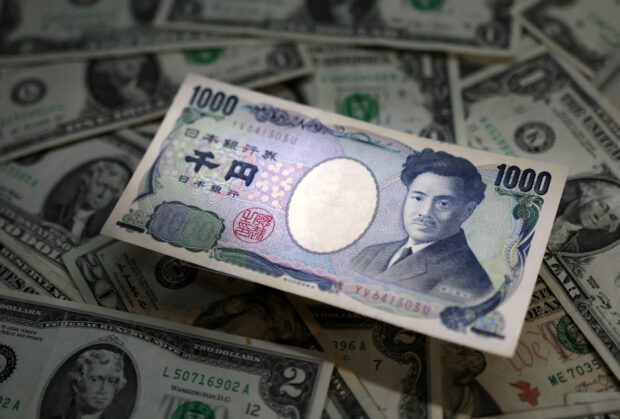Yen rallies on hints of BOJ policy shift

SINGAPORE – The yen extended its towering rally on Friday and marched toward its best week against the dollar in nearly five months, as traders ramped up expectations that the end of Japan’s ultra-low interest rates was closing in.
The broad strength from the yen kept a lid on the dollar, which stayed on the defensive ahead of the closely-watched U.S. nonfarm payrolls report due later on Friday.
Bank of Japan (BOJ) governor Kazuo Ueda said on Thursday the central bank had several options on which interest rates to target once it pulls short-term borrowing costs out of negative territory, and had on the same day met with Prime Minister Fumio Kishida.
READ: BOJ’s Ueda flags options on policy target upon ending negative rates
Markets took those comments as the clearest sign yet that the BOJ could soon phase out its ultra-loose monetary policy and catapulted the yen to multi-month highs against its major peers.
Against the dollar, the yen was last steady at 144.30, after having surged over 2 percent in the previous session and striking a four-month high of 141.60.
The yen had, as recently as a month ago, fallen to a one-year low of 151.92 per dollar, coming under pressure as a result of growing interest rate differentials with the United States.
That kept traders on edge over potential intervention from Japanese authorities to prop up the currency as it had done last year.
The Japanese currency similarly stood near Thursday’s four-month peak on the euro, and was last at 155.67 per euro.
READ: Yen’s slide to multi-decade lows keeps markets on intervention alert
The Aussie meanwhile last bought 95 yen, retracing some of its losses from the previous session where it fell nearly 2 percent.
Attention now turns to the BOJ’s upcoming two-day monetary policy meeting on Dec. 18.
“Obviously, the markets got very excited,” said Ray Attrill, head of FX strategy at National Australia Bank (NAB). “But I think a lot of us have felt that we were going to have some sort of more meaningful policy change this year, and we’ve been disappointed. So I’m a bit reluctant to jump on the bandwagon and say that (a change) is going to happen on the 19th.
“But obviously, there’s no smoke without fire… So I guess the market is understandably taking the view that the December meeting is live now.”
All eyes on payrolls
In the broader market, the dollar largely drifted sideways, with currency moves outside of the yen subdued ahead of Friday’s U.S. jobs data.
The euro steadied at $1.0792 though was eyeing a weekly decline of more than 0.8 percent, while sterling last bought $1.2589 and was similarly headed for a weekly fall of nearly 1 percent.
The U.S. dollar index slipped 0.05 percent to 103.63, though was on track to gain 0.4 percent for the week. That would snap three straight weeks of declines, as the greenback attempts to stem losses from its heavy selloff in November.
“I’m more interested in seeing what happens with the unemployment rate and what happens with average earnings than the nonfarm payrolls numbers,” said NAB’s Attrill.
“Obviously, if we get a big shock on the payrolls – a big downside or upside surprise – the markets’ initial reaction will be governed by that.”
Elsewhere, the Australian dollar slipped 0.05 percent to $0.6599.
In China, the offshore yuan edged 0.1 percent higher to 7.1560 per dollar.
Data on Thursday showed the country’s exports grew for the first time in six months in November, though imports unexpectedly shrunk.
READ: China’s exports grow for first time in six months, imports shrink
Concerns over the country’s growth outlook continue to mount, with investor sentiment still fragile on the back of an uneven post-COVID recovery in the world’s second-largest economy.
Moody’s had, earlier this week, slapped a downgrade warning on China’s credit rating, and followed up a day later with cuts to its outlook on Hong Kong, Macau and swathes of China’s state-owned firms and banks.
“Moody’s downgrade of China’s rating outlook was motivated by concern over China’s rising debt levels and possible need to bailout local state-owned enterprises,” said William Xin, fixed income portfolio manager at M&G Investments, though he said the move had “failed to consider” Chinese policymakers’ emphasis on reducing debt over the years.